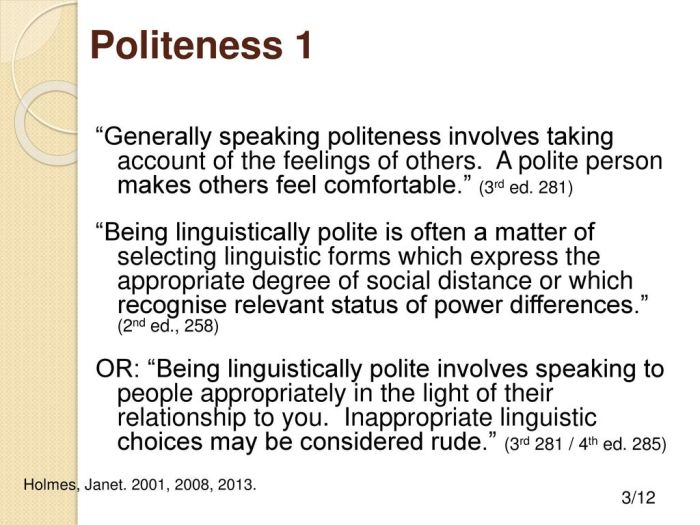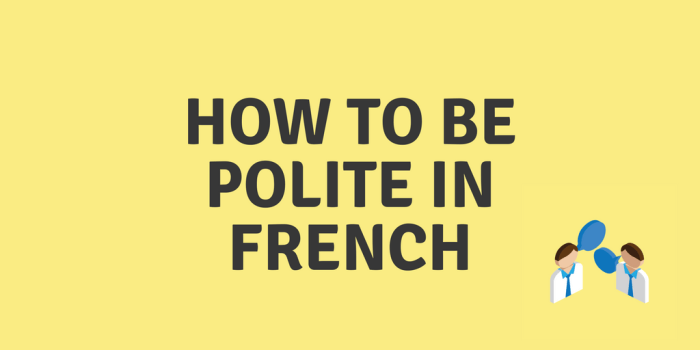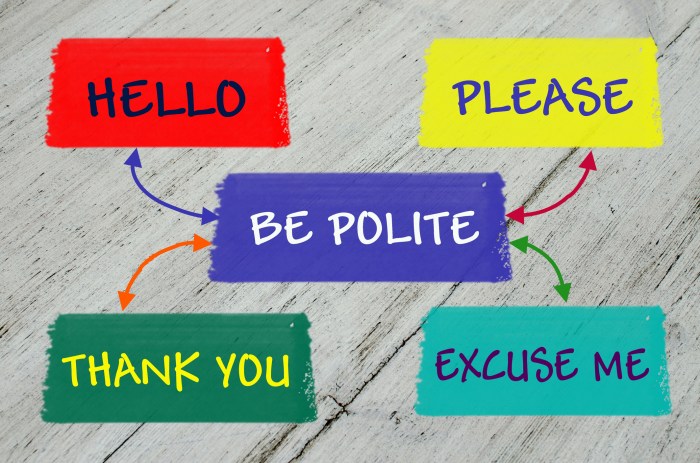As many forms of politeness and discretion involve being deceptive takes center stage, this opening passage beckons readers into a world crafted with academic authority, ensuring a reading experience that is both absorbing and distinctly original.
Politeness and discretion are often considered essential virtues in social interactions, fostering harmony and respect. However, the line between these virtues and deception can sometimes blur, raising ethical concerns and challenging our understanding of authentic communication.
Definitions of Politeness and Discretion

Politeness refers to the set of rules and behaviors that govern respectful and considerate interactions in society. It involves showing regard for others’ feelings, needs, and boundaries, and using language and actions that maintain harmony and avoid causing offense. Discretion, on the other hand, is the ability to maintain secrecy or refrain from sharing information that could potentially harm or embarrass others.
Both politeness and discretion are essential for maintaining positive social relationships.
Forms of Deceptive Politeness and Discretion

While politeness and discretion are generally considered positive qualities, there are situations where they can involve deception. Deceptive politeness occurs when individuals use polite language or behavior to mask their true intentions or feelings, often to avoid conflict or maintain a sense of harmony.
Deceptive discretion involves withholding or manipulating information to protect someone’s privacy or reputation.
Reasons for Deceptive Politeness and Discretion
- To avoid conflict or confrontation
- To maintain a sense of harmony and social cohesion
- To protect someone’s privacy or reputation
- To avoid causing offense or embarrassment
Consequences of Deceptive Politeness and Discretion
- Can undermine trust and authenticity in relationships
- Can lead to misunderstandings and resentment
- Can be seen as manipulative or dishonest
- Can create a sense of unease or distrust
Ethical Implications of Deceptive Politeness and Discretion
The use of deceptive politeness and discretion raises ethical concerns. While it may be necessary in certain situations to maintain harmony or protect someone’s well-being, it is important to consider the potential consequences and the boundaries of acceptable deception.
Potential Harm of Deceptive Politeness and Discretion
- Can undermine trust and authenticity in relationships
- Can lead to misunderstandings and resentment
- Can be seen as manipulative or dishonest
Potential Benefits of Deceptive Politeness and Discretion
- Can help to maintain harmony and social cohesion
- Can protect someone’s privacy or reputation
- Can avoid causing offense or embarrassment
Strategies for Maintaining Politeness and Discretion Without Deception: Many Forms Of Politeness And Discretion Involve Being Deceptive

It is possible to maintain politeness and discretion without resorting to deception. This involves being mindful of one’s language and actions, and considering the potential impact on others. Effective communication techniques that foster respectful interactions include:
Effective Communication Techniques, Many forms of politeness and discretion involve being deceptive
- Using respectful language and avoiding offensive or inflammatory terms
- Listening attentively and showing empathy for others’ perspectives
- Being honest and transparent, while also being mindful of others’ feelings
- Using humor appropriately and avoiding sarcasm or mockery
Cultural Variations in Deceptive Politeness and Discretion

Cultural norms influence the use of deceptive politeness and discretion. In some cultures, it is considered polite to avoid direct confrontation and to use indirect language or gestures to convey messages. In other cultures, directness and honesty are valued more highly.
Challenges and Opportunities of Cultural Differences
- Navigating cultural differences can be challenging, but it also presents opportunities for learning and growth
- Understanding cultural norms can help to avoid misunderstandings and build stronger relationships
- Respecting cultural differences is essential for fostering a harmonious and inclusive society
Query Resolution
What are the main reasons why people engage in deceptive politeness and discretion?
Individuals may resort to deceptive politeness and discretion for various reasons, including avoiding conflict, maintaining social harmony, protecting self-esteem, or gaining personal advantage.
What are some strategies for maintaining politeness and discretion without resorting to deception?
Effective strategies include using indirect language, offering constructive criticism in a respectful manner, setting clear boundaries, and practicing active listening.
How do cultural norms influence the use of deceptive politeness and discretion?
Cultural norms play a significant role in shaping the use of politeness and discretion. In some cultures, indirect communication and subtle hints are highly valued, while in others, directness and transparency are preferred.